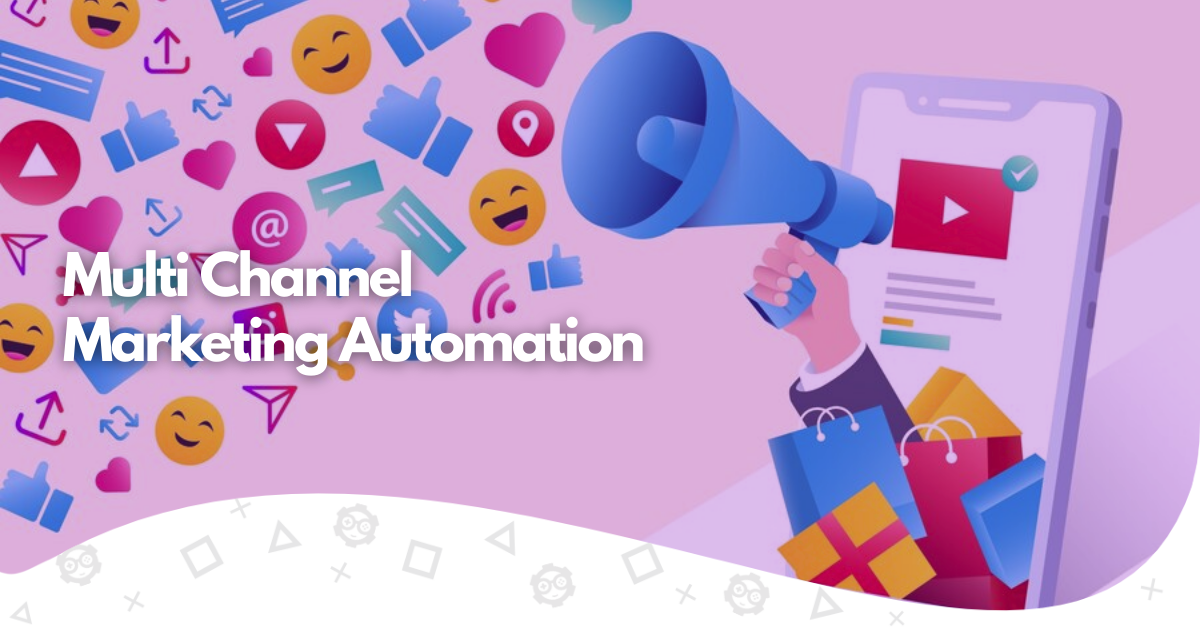In today’s fast-paced world, it’s imperative for companies to leverage all communication channels to cultivate meaningful and profitable relationships with their customers. With new modes of interaction emerging daily, resting on one’s laurels is not an option. Moreover, each customer or prospect has their own distinct worldview and preferences when engaging with brands for products and services.
Multi-channel marketing automation can be beneficial for ensuring consistent messaging across all channels. It lets companies coordinate their messages across different platforms and personalize interactions for each customer. This improves customer experience, making marketing efforts more efficient.
In this text, you’ll discover:
- What is multichannel marketing automation;
- What are the benefits of a multichannel approach;
- What is the difference between omnichannel and multichannel approach;
- The best sites to implement a suitable multichannel marketing strategy.
- What Is Multi-Channel Marketing?
- Key Features of Multi-Channel Marketing Campaigns
- What Is the Difference Between Omnichannel and Multichannel?
- What Are the Advantages of Multi-Channel Marketing Automation?
- How to Automatize Your Multi-Channel Marketing Campaign?
- Best Platforms for Multi-Channel Marketing Automation
- Wrapping It Up
What Is Multi-Channel Marketing?
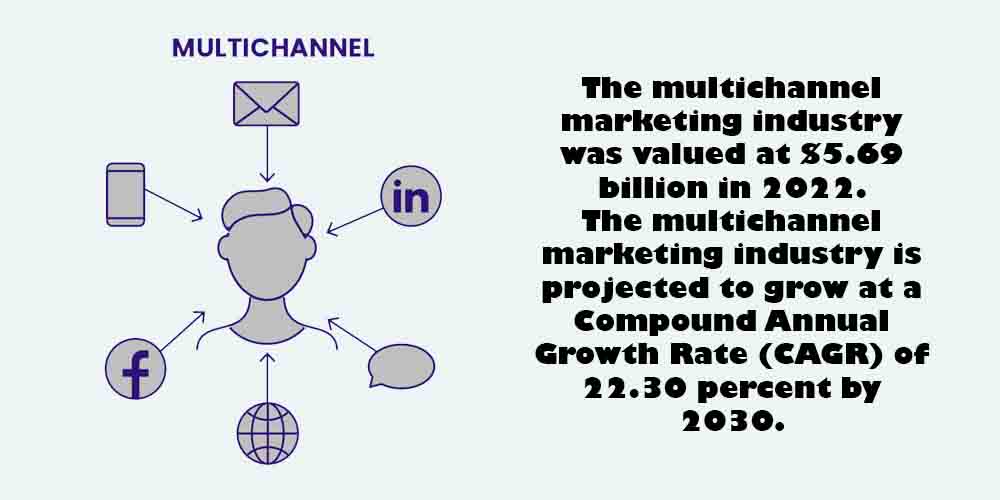
Source: Blog.mandalasystem.
Multi-channel marketing is a type of marketing that considers all the available channels when it comes to promoting products.
In multi-channel marketing strategies, businesses address potential customers and existing clients through different communication channels, either digital or traditional, to provide the best service according to the needs of customers.
Some potential customers prefer to be contacted via email or WhatsApp message, while others would rather have a phone call or chatbot conversation. Thus, multi-channel marketing campaigns should focus on understanding prospects’ needs and wants.
In this sense, customer data is crucial to understanding customer behavior and boosting particular channels that deliver the best conversions and customer retention results.
Multi-channel marketing automation includes website and email personalization, database segmentation, marketing automation, lead nurturing, multichannel communication (chat, phone, messaging, email), sales automation, lead scoring, and try-before-you-buy programs.
To learn more, review multi-channel PPC advertising case studies to understand the relevance of a multi-channel approach for your business.
Key Features of Multi-Channel Marketing Campaigns
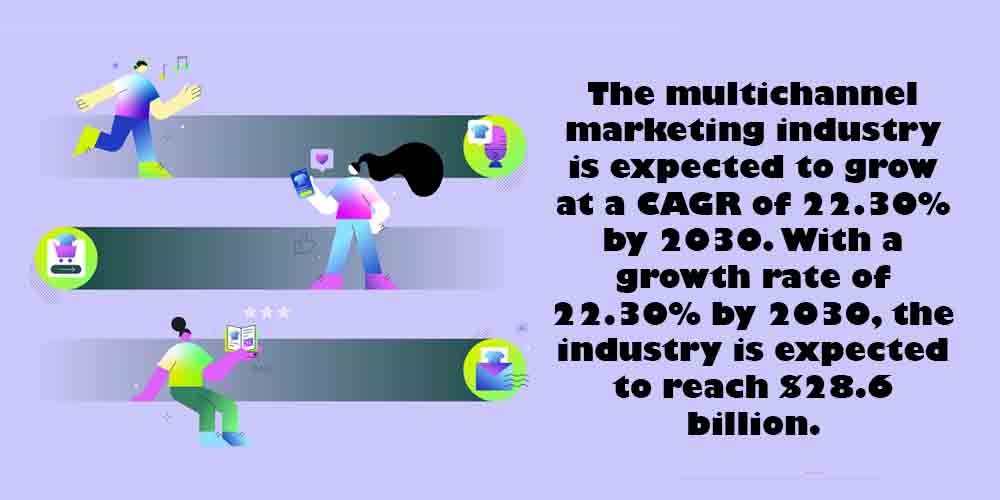
Source: Marketresearchfuture.
Multi-channel marketing campaigns are characterized by the following aspects:
- Segmentation
When creating any marketing campaign, it is important to differentiate audiences and customers based on various aspects such as needs, demographics, location, social status, and more. This practice allows you to better target customers, both new and old, by bringing them together and offering them products and services through particular channels that best suit them. Segmenting customers is also the best practice for following the buyer’s journey.
- Precision
Precision is a truly important concept within multichannel marketing. It promotes the selection of the most appropriate channel to reach a group of customers. In this way, the marketing team must choose which channels to use to target segmented audiences. Generally speaking, the more precise the approach, the better the chances of getting leads and conversions.
- Personalization
One of the strengths of multichannel campaigns is the possibility of delivering personalized messages using various channels that can reach customers’ hearts and consciences.
For example, your sales team can build personalized email campaigns that offer specific products to customers with high purchase intent. These emails should not only include the customer’s name. Their content should also be based on the customer’s previous behavior to offer them a product tailored to their potential needs and preferences. This tactic works great when addressing a remarketing stage.
- Automation
Since a multi-channel marketing strategy will probably address hundreds or thousands of customers—it will depend on the reach of the campaign or the size of the business—it’s crucial to implement automation tools that administer messaging and contact customers. This way, technology transformation is the right path to constantly enhance automated workflows and reply communication processes.
What Is the Difference Between Omnichannel and Multichannel?
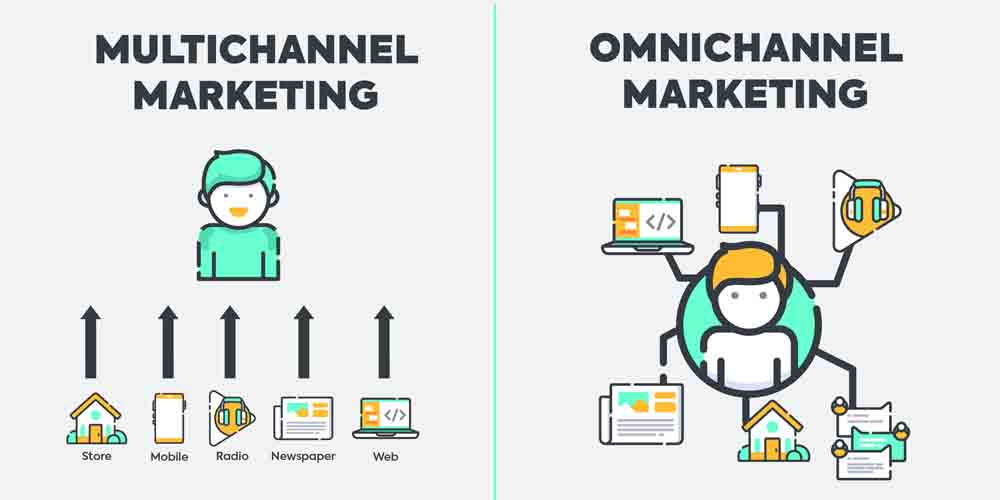
Many marketers, whether newbies or seasoned, often mix up the terms “multichannel” and “omnichannel.” It’s not surprising because they sound alike and cover similar ideas. But there are some important differences to note.
As we mentioned in a previous section, multichannel refers to efforts that address the customer from various points of view and channels. In this way, you publish advertisements, marketing content, banners, audio, and videos and make phone calls to provide information to the customer and solve their problems. In multichannel approaches, your brand is attentive to contacting the customer and delivering solutions as quickly as possible.
On the other hand, when implementing an omnichannel strategy, you do not only publish ads, texts, videos, audio, etc.; you rather prefer to put yourself in your customer’s shoes and try to create a mass message based on the customer’s behavior, interactions, and interests. This way, the client is the center of the strategy you use.
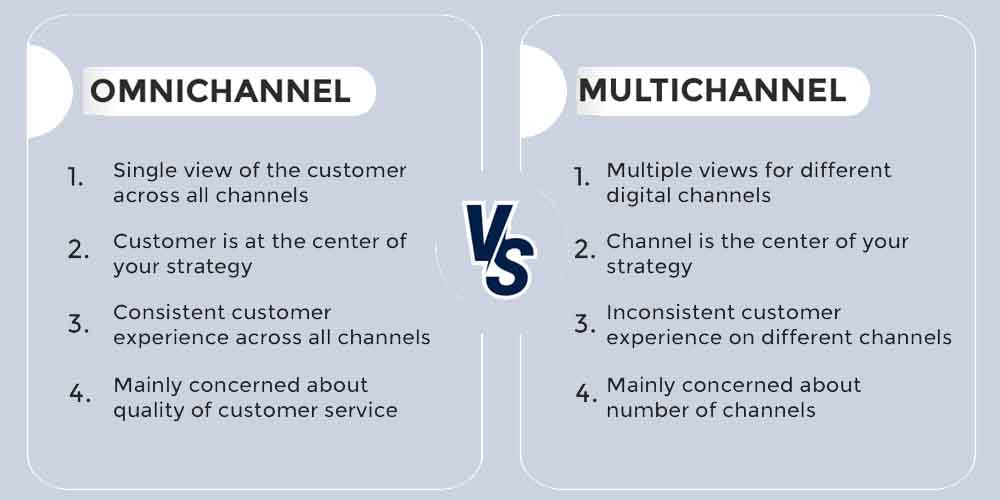
Source: Locobuzz.
Let’s exemplify the above!
Let’s say you abandon a cart in the last step of the purchasing process. The company will probably send you several messages through different channels offering the same cart or a particular discount for you to purchase it. In this context, the offer does not change on all channels, and there is no personalized strategy either. An omnichannel strategy, on the other hand, integrates all channels and focuses on those that the customer uses most to provide a complete and personalized experience.
Some experts mention that an omnichannel strategy is an optimized multichannel strategy that provides comprehensive support for all channels and allows customers to contact the brand through the medium they prefer. An omnichannel strategy helps customers move toward a resolution easily and naturally.
What Are the Advantages of Multi-Channel Marketing Automation?
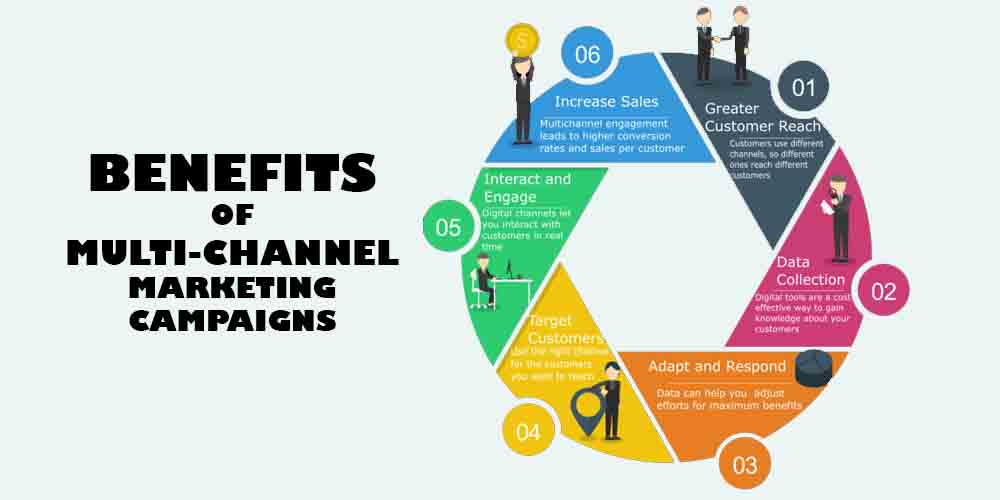
Source: LinkedIn by Prakash Mishra.
Due to their characteristics, multiple channels bring multiple benefits to your brand and your potential and existing customers. Let’s look at the main ones.
- Saving Time and Money
The quintessence of automation is to save time and resources. Consequently, you can allocate those resources and time to creating or planning activities that add value to your business. Manually creating, updating, and managing audiences and marketing materials based on prebuilt rules and configurations will also allow you to address the right audiences at the right time.
- Enhancing Customization and Relevance
Audience segmentation will allow you to create simpler campaigns that target and lead directly to customers, thanks to personalization. Therefore, customers will engage with your brand because they feel that it is addressed to them personally. Additionally, since personalization increases lead nurturing and customer engagement, your brand and product will be more relevant to customers, meaning they will prefer your business in the future when they need a product like yours.
In a few words, you should tailor your campaigns and all their components, such as SMS, social media posts, WhatsApp messages, etc., to match their preferences and buying stages.
- Optimize Performance and Increase ROI
With a better understanding of which channels work best with a particular audience and segment, you can optimize resources and improve campaign performance by reducing the buyer’s journey and the time between contacting a customer and converting.
Additionally, focusing on optimization will allow you to implement an efficient and more scalable CRM solution that ensures the success of your campaign. This situation will undoubtedly generate more revenue for your company, which means an increasing ROI or return on investment.
- Improve Clients’ Engagement and Retention
Personalization is a valuable tool for differentiating your brand or product from other companies or direct competitors. If you offer a customized solution that solves specific needs, your business will probably stand out over other brands in similar industries.
In the long run, word of mouth and other broadcast media will enhance your business growth. Therefore, customers will feel loyal to your brand, boasting excellent long-term relationships between your solutions, teams, and clients.
Read our How to Get Quality Traffic to Your Website article and learn how optimization can help you with these goals.
How to Automatize Your Multi-Channel Marketing Campaign?
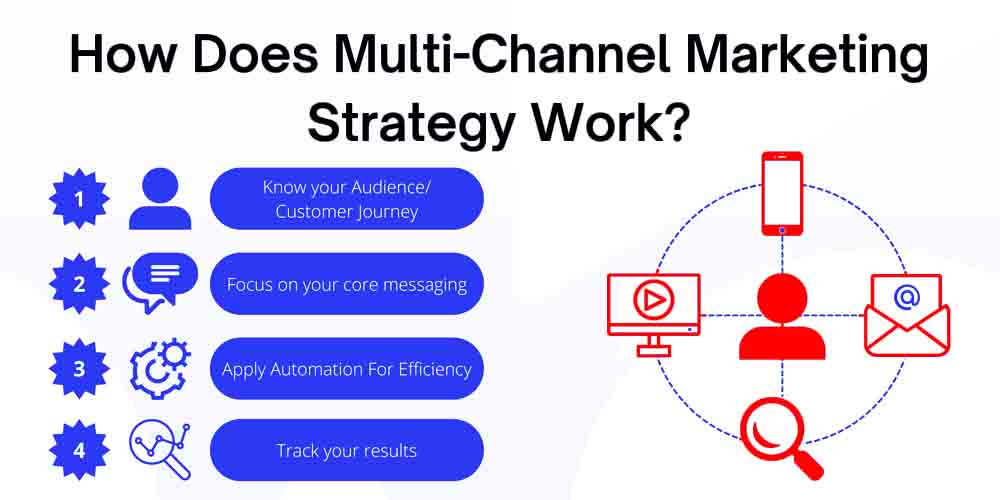
Source: Agencyjet.
Consider the steps and tips below when optimizing your multi-channel marketing campaign. They will be very helpful for your medium—and long-term goals.
- Carry Out a Gut Check on Your Multi-Channel Branding
Since a multichannel campaign involves reaching and engaging customers through different channels, whether direct or indirect, you must ensure that your websites represent your brand values. Some common channels include:
- Social media;
- Emails;
- Physical stores;
- Direct mails;
- Content marketing;
- PPC advertising;
- SEO.
Keep your multichannel brand message clear and consistent throughout the funnel and levels to ensure a positive presence of your brand in the customer’s mind.
- Leverage all the Available Channels
Consider investing in a multi-channel marketing approach that includes leveraging all the channels mentioned above. This strategy aims to send traffic to selected landing pages and category pages. Its main benefit is that it streamlines business processes and increases your campaign’s scalability. Pay special attention to the following channels and create a complex, hybrid strategy that offers useful solutions to customers.
- Email. Continuously deliver personalized emails offering various products and services that may be interesting to customers or audiences. Emails can also invite customers to read important content on your business blog.
- Paid Search. Ads appearing in the search results are a good way to remind users of the possibility of acquiring some of your products or services. According to Lunio, users are four times more likely to click on search ads on Google (63%) than on any other search engine.
- Organic Search. You cannot forget SEO as one of the pillars of your multichannel marketing strategy. Consider all aspects of search engine optimization, such as keywords, word count, images, backlinks, and others, when creating content within your various websites.
- Multi-channel Content marketing. Create copy for all your channels and continually update it to provide evergreen content that fosters the relationship between your brand and your customers.
- Create a Task Section
Create a dashboard that contains all the tasks your team needs to complete across all channels to keep customers interested in your product or brand. We recommend you include the following columns.
- Prospect column. Corresponds to the potential or existing client.
- Activities column. In this column, you list all the actions you need to complete related to that particular customer.
- Message field. Here, you type the exact message (email, ad, content, etc.) that you want to send to the particular customer.
- Note field. You can add a field that includes additional information about the context of the specific message or customer.
- Develop a Huge Content Marketing Campaign
The final step may seem easy, but it demands plenty of effort and resources. You’ve got to generate loads of content for all the channels you handle. It’s not just about writing for your website or blog; you need diverse content like podcasts, articles on external sites, community messages, and partnerships with other brands.
Investing in digital expertise is crucial, and sometimes, outsourcing to agencies can be helpful.
Best Platforms for Multi-Channel Marketing Automation
Let’s review some of the best platforms and tools that will help you automatize your multi-channel marketing efforts.
- Brandwatch Social Media Management
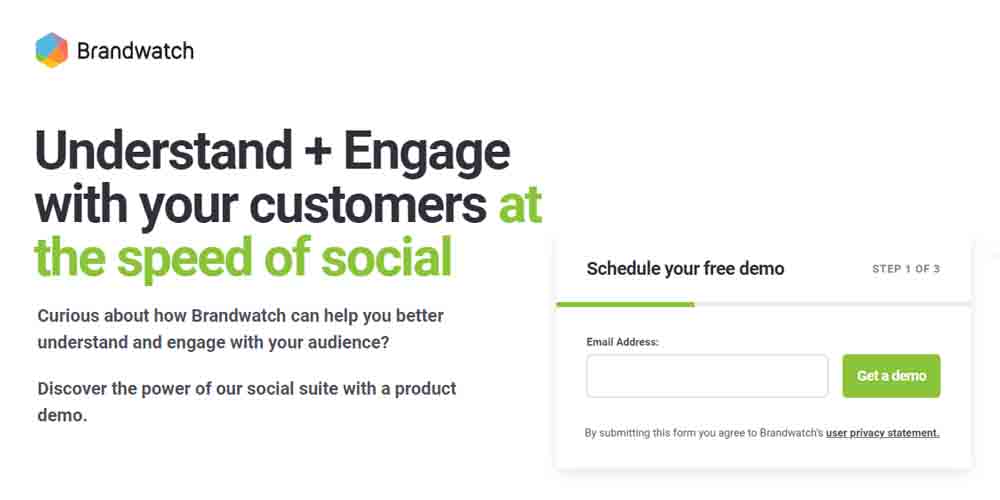
Brandwatch is a marketing automation platform that focuses on understanding its clients and promoting engagement between you and your clients. It has a complete social suite with multiple software to entice and retain that difficult-to-satisfy client. With Brandwatch’s powerful tools, monitoring clients, competitors, and trends is easier.
Brandwatch is a perfect tool for multi-channel marketing automation since it facilitates creating automated ad campaigns, comparing and contrasting with benchmarking, tracking the performance of all your channels, understanding your consumers for better interactions, and funneling all relationships into one inbox.
- Mail Chimp
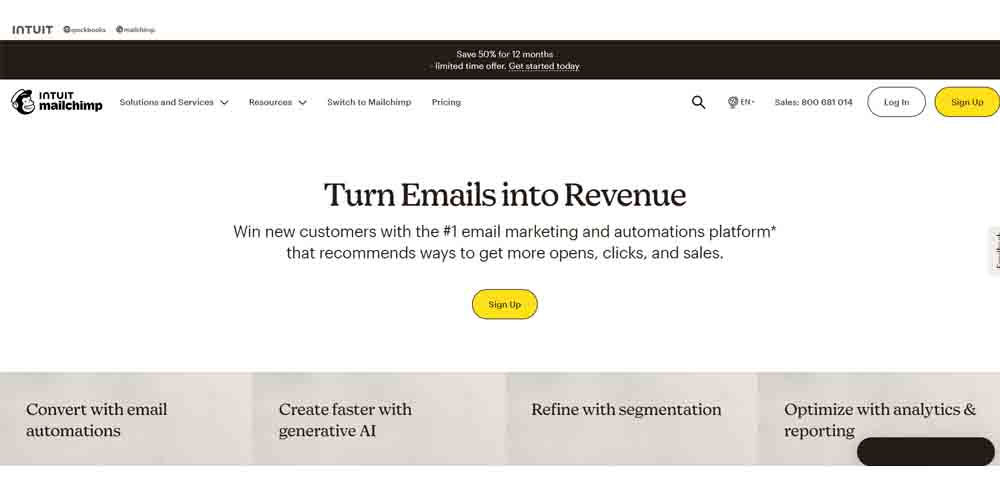
MailChimp has an interesting customer journey builder automation that allows you to target customers at the right time in the shopping experience. The automation triggers emails based on customer experience and behavior, thus generating more traffic and sales in the short term.
MailChimp also pays special attention to cross-selling, offering different products at different levels of the funnel. Thanks to this function, you can recover abandoned carts, re-engage website or app users, and optimize your acquisition of new leads. Plus, MailChimp helps you build customer loyalty with engaging, evergreen content.
- Engagebay
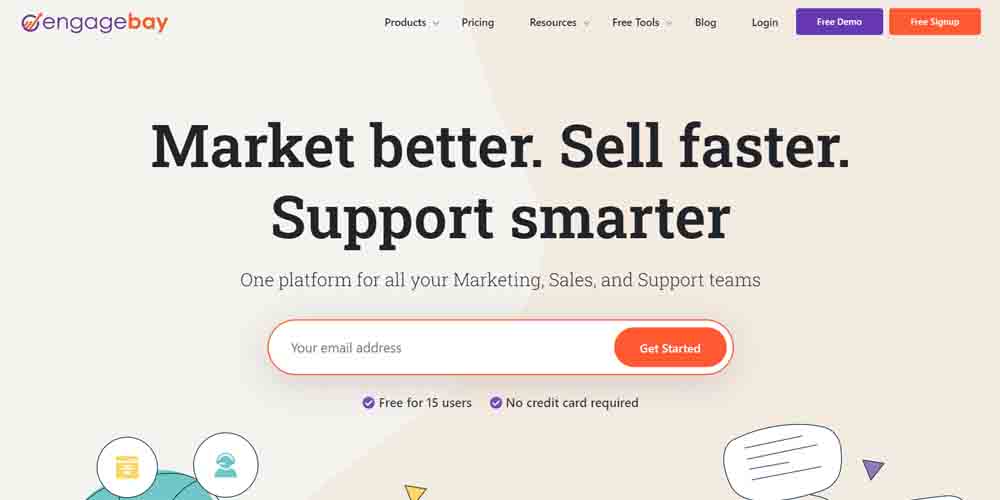
Engagebay is an all-in-one platform, marketing, and CRM software that integrates omnichannel automation and an easy-to-understand interface as a workflow builder. Engagebay has multiple capabilities, such as automated lead scoring. Thanks to this tool, you can set your parameters to evaluate the lead score and sit back and wait for the results. Engagebay uses customer behavior data to target the most attractive prospects.
Engagebay also integrates customer-specific autoresponders and personalization features that allow you to automate ongoing content through effective segmentation tools that separate audiences based on markets and customer behavior.
- ActiveCampaign
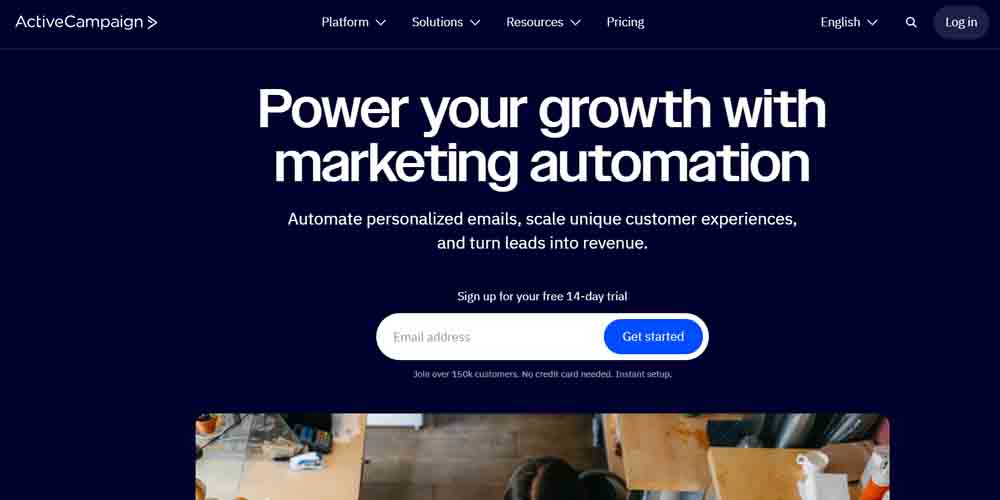
Similar to MailChimp, ActiveCampaign is an all-in-one automation software strongly focused on sales management and email marketing. ActivaCampaign specializes in scaling customers’ experience to provide personalized services to targeted customers. The tool is great for listing segmentation and managing groups by tagging and sorting them.
ActiveCampaign also incorporates autoresponders that improve the effectiveness of communication between your team and clients. However, these autoresponders feel very intuitive, so conversations will flow as real ones, enhancing the salesforce and better using your marketing budget.
Since ActiveCampaign knows that analytics are crucial for user acquisition and retention, it can automatically track data from landing page visitors, text messages, live chat, social media, and other relevant systems of sources.
Wrapping It Up
A multichannel approach is an essential campaign that you must implement, always with the right focus on offering the best solution for your customers. For inspiration, check out our 5 Inspiring Marketing Success Stories and discover how comprehensive multichannel and omnichannel campaigns can help you take your business to the next level.

Visual artist, professional writer, and senior content creator specializing in digital marketing and copies that resonate with readers and users. For more than eight years, he has provided significant contributions to companies interested in positioning their brands and products by creating marketing strategies and high-quality content based on SEO. His writing ranges from construction and architecture to gaming and cryptocurrencies, including sales, investments, travel, and more. Currently, he participates in several Spanish and English companies, proposing, planning, and delivering unique copies. Football player twice a week, a published author, and a fan of the Final Fantasy series.

